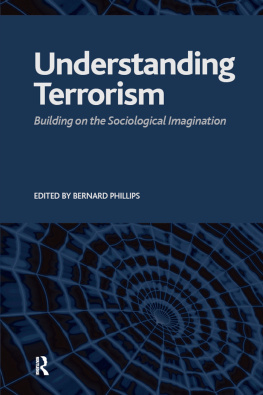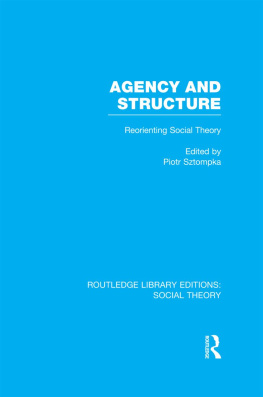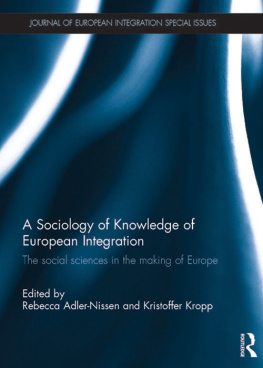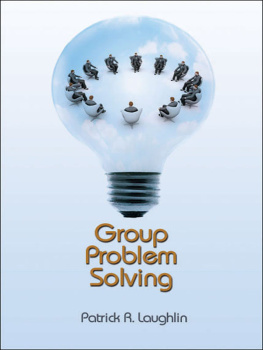UNDERSTANDING TERRORISM
Advancing the Sociological Imagination
A Series from Paradigm Publishers
Edited by Bernard Phillips and J. David Knottnerus
Goffman Unbound! A New Paradigm for Social Science
By Thomas J. Scheff (2006)
The Invisible Crisis of Contemporary Society:Reconstructing Sociologys Fundamental Assumptions
By Bernard Phillips and Louis C. Johnston (2007)
Understanding Terrorism:Building on the Sociological Imagination
Edited by Bernard Phillips (2007)
Struggles before Brown: Early Civil Rights Protests and Their Significance Today
By Jean Van Delinder (2008)
Postmodern Cowboy: C. Wright Mills and a New 21st Century Sociology
By Keith Kerr (2008)
The Treadmill of Production: Injustice and Unsustainability in the Global Economy
By Kenneth A. Gould, David N. Pellow, and Allan Schnaiberg (2008) Forthcoming
Forthcoming
Ritual as a Missing Link within Sociology: Structural Ritualization Theory and Research
By J. David Knottnerus (2009)
UNDERSTANDING TERRORISM
BUILDING ON THE SOCIOLOGICAL IMAGINATION
edited by Bernard Phillips
First published 2007 by Paradigm Publishers
Published 2016 by Routledge
2 Park Square, Milton Park, Abingdon, Oxon OX14 4RN
711 Third Avenue, New York, NY 10017, USA
Routledge is an imprint of the Taylor & Francis Group, an informa business
Copyright 2007, Taylor & Francis.
All rights reserved. No part of this book may be reprinted or reproduced or utilised in any form or by any electronic, mechanical, or other means, now known or hereafter invented, including photocopying and recording, or in any information storage or retrieval system, without permission in writing from the publishers.
Notice:
Product or corporate names may be trademarks or registered trademarks, and are used only for identification and explanation without intent to infringe.
Library of Congress Cataloging-in-Publication Data
Understanding terrorism : building on the sociological imagination / edited by Bernard Phillips ; contributors, J. I. (Hans) Bakker [et al.].1st ed.
p. cm.
Includes bibliographical references.
ISBN: 978-1-59451-373-2 (hardcover : alk. paper)
ISBN: 978-1-59451-374-9 (pbk : alk. paper)
1. TerrorismSocial aspects. 2. Integration (Theory of knowledge) 3. Whole and parts (Philosophy) I. Phillips, Bernard S. II. Bakker, J. I., 1947-
HV6431.U348 2007
303.625dc22
2007016063
Designed and Typeset by Straight Creek Bookmakers.
ISBN 13: 978-1-59451-373-2 (hbk)
ISBN 13: 978-1-59451-374-9 (pbk)
Contents
, Bernard Phillips
, J. I. (Hans) Bakker
, Bernard Phillips
Weltanschauung, Adam Rafalovich
, Thomas J. Scheff
, Jonathan H. Turner
, Todd Powell-Williams
, Sandro Segr
, Bernard Phillips
, Bernard Phillips
As our planet travels through space, are we passengers in much the same situation as those who flew United 93 on 9/11? Is it true that we, too, are flying on a suicide mission pointing us all toward disaster? It was chilling to see passengers concerned with choosing whether to have a Coca-Cola or a Sprite in the film on this tragedy, yet all the while we saw the tense faces of the suicide hijackers as they prepared to crash the plane into the Capitol or White House. Are we also continuing to make choices that are completely trivial relative to the dangers that are confronting us?
It is indeed tempting for us social scientists to focus on problems in society while ignoring the problems within our own disciplines. Yet are our own failures intimately linked to those external problems? For example, does our present inability to integrate the knowledge located within the forty-four sections of the American Sociological Association make it extremely difficult to apply a broad understanding of human behavior? Are social scientists more responsible than any other group for the inability of political leaders to solve problems because they cannot build on deep understanding?
Not all of the passengers on United 93 continued to fiddle while Rome burned. We know of a desperate effort to take back control of the plane from the hijackers, with the words Lets roll followed by an effort to storm the cockpit. Although that effort ultimately resulted in the planes crashing in a Pennsylvania field killing everyone on board, it did succeed in preventing yet another disaster on 9/11. Can we social scientists take a lesson from those few individuals who were able to wake up from a comforting dream that they would somehow survive? Are we able to gain awareness of present threats from a range of problems like terrorism? And can we succeed in developing a platform of understanding that political leaders can use to launch effective problem-solving efforts?
My own answer to all of these questions is affirmative, based on results presented in this volume, in four monographs published by myself and others in the Sociological Imagination Group over the past six years, and in a very long list of prior publications throughout the social sciences and philosophy, providing a framework for this recent work. It is indeed very late in the day, but it is not too late to turn things around. Lets roll can be a rallying cry for us no less than for those passengers on United 93. This volume points us, more specifically, toward building on the ideals and ideas that C. Wright Mills expressed in The Sociological Imagination. That vision embodies an approach to the scientific method that provides an initial framework for integrating the knowledge throughout the social sciences. Such integrated knowledge can, in turn, be applied to any given problem, such as that of terrorism.
Of course, we are a long way from integrating that knowledge, and also a long way from using integrated knowledge to solve the problem of terrorism or any other major social problem. Yet I and my colleagues in this volume believe that it illustrates the potential that a broad approach to the scientific method has for making substantial progress on fundamental social problems. That approach follows the scientific ideal of opening up to the full range of phenomena relevant to a given problem. In this way we are able to take seriously the enormous complexity of human behavior. And that means as well that we open up to the forces within our own behaviorfollowing Alvin Gouldners call for a reflexive sociologywhich prevent us from following the ideals of the scientific method.
This volume is not a product of specialists on terrorism. Rather, it was written by individuals who believe that they can make a substantial contribution to our understanding of this problem by using an approach to the scientific method that is broad enough to take into account human complexity. In addition to the listed contributors to this volume are several unlisted ones: David Christner and Louis Johnston, whose encouragement and commitment were essential, and Martha DeWitt together with Hilarie Roseman, who presented us with insights on the nature and impact of terrorism.
It is not just the effort to understand terrorism that holds these essays together. It is also the method used by the authors: the Web and Part/Whole Approach to the scientific method. I outline and illustrate the nature of this approach in , and I contrast it with the methods generally used by sociologists and other social scientists.







